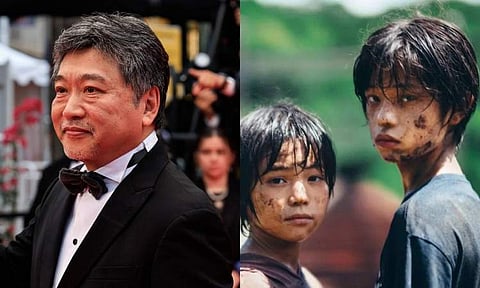

Hirokazu Kore-eda’s 16th feature film, Monster (Japanese title Kaibutsu) marks a welcome return to his roots in Japan after taking detours into South Korea (Broker in 2022) and France (The Truth, 2019). It also has him working on another writer’s—Yuji Sakamoto—screenplay for the first time since his fiction feature debut with Maborosi in 1995.
Monster revolves around a mother who, after worrying about the behavioural changes in her son, starts suspecting that his teacher might be the root of all the troubles. The film won the best screenplay award at the Cannes Film Festival where it had its world premiere in May this year. It also won the independent Queer Palm award at Cannes. Monster is playing in India now in the World Cinema section of the Jio MAMI Mumbai Film Festival.
In an exclusive conversation with CE, Kore-eda talks about how he can’t give up on editing his own films and the fact that he has done teacher’s training and even has a teaching licence
Excerpts:
On opting to tell the story from different points of view
The three-part structure was there in the plot that was handed to me. So, the idea came from Yuji Sakamoto, the screenwriter. I recognised, of course, that this was a Rashomon-like structure, but I didn't want it just to end with the fact that there are three contrasting truths. I wanted to go beyond that.
On working on somebody else's screenplay, the advantages and challenges involved
It wasn't as though I was handed a finalised screenplay and told, here, direct this. I got the plot in December of 2018 and then it was three years of back and forth between myself and the screenwriter to come up with the finished screenplay. So, by the time I started filming, it didn't feel that different from having written something myself. However, the storytelling is something that I couldn't have done myself. It has a real momentum and this drive to keep things moving and to find out what happens next. It's very different from my usual slice-of-life stories. It has a very strong narrative. So, I think it was a great collaboration.
On the unique tempo and pace in his films
I think that happens in the edit. I've worked on things other people have written. I've worked with other people's screenplays. But the one thing I will always do myself is editing, because that's where you find the rhythm of the film, that's where you hear the heartbeat of this living thing that is a film. Rhythm is not exactly the same as instinct. It's like music, the conductor's rhythm is the rhythm that I find in the edit. That's where the tempo and the drive come from.
On the film’s sensitive core—the friendship between two adolescent boys—in the face of rising conservatism in the society around us
I think it's a subject matter that does require some courage and sensitivity. I did my best to learn in the process of making this film. I tried to be as prepared as possible. I did lots of interviews, and I held workshops, including with children in their senior years of primary school. I tried to learn about sexual development, sexual identity, expression, the different forms that it takes, and the fact that all of these are “normal”. It’s what I needed to be careful of as I was making this film. I think this is a film that's fine for children to watch.
On the portrayal of the politics of the school
I actually have a teaching licence. I did my teacher’s training. So, I encountered the monster known as a school back in my twenties. And I'm surrounded by teachers. A lot of my friends, my age or a bit younger, are either head teachers, deputy head teachers, or they work for the board of education. So, I spoke to a lot of them. I think even if we don't say it out loud, that desire to protect the organisation is innate.
There’s a tendency nowadays to be more critical of this group mentality, but it's something that we still can't get away from. I didn't set out to purely criticise that group mentality. I wanted to show the potential for darkness in organisations as well as individuals. For example, the mother who wants to protect her son, uses those same words that have hurt her son('you've got a pig's brain'), against the teacher believing that to be justice. You see just how far a person can and will go. I think that's very real. It’s the same with this group mentality. It may seem surreal, but actually, this is quite possible, that a mother might act this way, and that a school might act this way. That’s what I want to show: how far people can go.
On how he works so fast on films—Broker in 2022, Monster in 2023.
There are two of me (laughs)…So, I started working on this film in 2018 and then we stopped in 2019 because of COVID. It was delayed by two years, and I had heard that we might be able to film in Korea despite the pandemic. So, as it turned out we went over to Korea, first shot Broker there, then came back. I was always doing the work for this film behind the scenes. So, we had the screenplay done. Last year I was in Cannes [with Broker], but before and after that we were filming Monster.